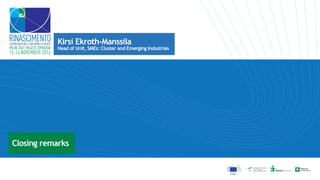Manssila
- 1. Closing remarks Kirsi Ekroth-Manssila Head of Unit, SMEs: Cluster and Emerging Industries
- 2. Europe must maintain a vigorous and competitive economy and a strong industry. This means we must better exploit the transformative power that arises from cross-sectoral innovation by stimulating more entrepreneurship and collaboration across and along value chains and the redefinition of industrial value chains. To capitalise on the potential of emerging industries we need to be much more aware of where new ideas are most likely to emerge and what drives them, and we must provide them the right conditions to ensure that they develop into viable business propositions. The European Industrial Renaissance Communication calls for a better use of the potential of clusters to create such favourable innovation ecosystems for groups of SMEs as a means to promote growth. It goes on to say that the focus should not be limited to industrial sectors, but also to facilitate cross-sectoral and cross-border collaboration.
- 3. This is very much in line with our vision and ambition for the new European Cluster Strategy for Growth to be adopted in 2015. That is positioning clusters as integrators across policies, sectors, regions and borders with the aim of stimulating competitiveness and growth in Europe. At the European Cluster Conference in October, we already got some input on what the main hallenges to be addressed are and what the focus of the Cluster Strategy should be and this Emerging Industries Conference has certainly also given us food for thought. Early next year we will launch a public consultation on the new European Cluster Strategy for Growth. I would like to briefly share with you our current thinking on the Strategy so you can give some thought to what you think it should look like. 1. Support industrial transformation: Innovation is an important catalyst for growth. Companies in clusters innovate more, create more jobs and grow faster, so we need to build on this strength. 2. Facilitate emerging industries and new value chains: Clusters are now also acting as cross-sectoral brokers facilitating new forms of cooperation by combining technologies, services and products from different sectors. Cluster policies and support initiatives should be adapted to also encompass new forms of clusters such as those representing emerging industries.
- 4. 3. Strengthen SMEs' competitiveness: Clusters provide a fertile business environment for SMEs to grow, but there is still potential for a stronger integration and involvement of SMEs. Cluster policies should be reviewed to ensure they stimulate SME participation in clusters and that cluster organisations can cater for SMEs specific needs. 4. Accelerate regional smart specialisation: Cluster can help the implementation of Smart Specialisation Strategies and provide strategic support for regions to better exploit their strengths as well as for convergence between sectors and across regions. Cluster policies and regional development policies should be better aligned to make this happen. 5. Enable SME internationalisation: Clusters act as springboards for SMEs to access global value chains. Policies and instruments aimed at promoting SME internationalisation at European, national and regional levels should recognise the role of clusters in this respect. 6. Promote cluster excellence: World-class clusters require excellent cluster management. The European initiatives incentivising cluster management excellence such as benchmarking and labelling and training of cluster managers should be further developed and adapted to respond to the changing economic and business context.
- 5. These are what we see as the core elements of the new European Cluster Strategy for Growth. I would like to encourage you to use the public consultation to give us your perspective on how clusters can best contribute to ensuring that we capitalise on emerging industries as engines for growth in Europe's Industrial Renaissance. I would like to finish by thanking the Region of Lombardy and Eupolis for having organised this excellent conference together with us. You have demonstrated in a very creative way, the power of Rinascimento – that is the power of new thinking and new ways of doing things, of new collaboration and partnership, and the constant quest to explore uncharted territory. That is what emerging industries are all about! Last but not least, I would like to thank you, the participants, for your active participation and inspired contributions. I wish you all a safe journey home!
